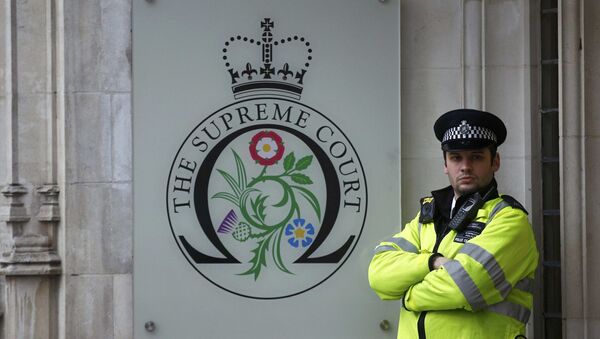Richard Gordon QC, the barrister appearing at the Supreme Court in London for the Welsh Government, was summing up on the last day of the challenge against May's government's contention that it alone has the powers to trigger Britain's exit from the European Union, without needing to go for a vote in parliament.
The landmark case follows the referendum, June 23, 2016, in which 52 percent of voters opted to leave the EU, while 48 voted to remain. Although the overall vote in the UK was to leave the EU, both Scotland and Wales voted to remain.
The Welsh advocate — along with those from Scotland and Northern Ireland — has joined the main challengers to the British Government is contending that parliament alone should have the right to invoke Article 50 of the Treaty of Lisbon, which begins the formal process of Britain leaving the EU.
Full transcript of Wednesday's proceedings now at https://t.co/aCEG8bBiAV plus video files via links at foot of https://t.co/8TrmvqBppi pic.twitter.com/aUtklp5Zkq
— UK Supreme Court (@UKSupremeCourt) December 7, 2016
However, the Welsh advocate based his argument on the fact that the legislation behind the Brexit vote — the Referendum Act 2015 — says nothing about the government's right to trigger Article 50 and should be totally ignored.
Richard Gordon QC, instructed by @WelshGovernment, addressing @UKSupremeCourt this morning #Brexit pic.twitter.com/ukvgmfaKKX
— Brick Court Chambers (@brickcourt) 8 December 2016
"The Referendum Act of 2015 has nothing to do with the issues in this case. It's a statute that had died. It has fulfilled its purpose. You cannot revive a corpse by tearing up the death certificate," he told the Supreme Court.
The advocates for Scotland, Wales and Northern Ireland have all argued — albeit from different legal perspectives — that the UK Parliament must be the final arbiter for triggering Brexit, as well as the devolved institutions in their respective countries within the United Kingdom
The UK Government's case is that the original European Communities Act 1972 and subsequent legislation concerning the EU allows the government to use its 'Royal Prerogative'- ancient powers to sidestep parliament — to make, amend or withdraw from treaties.
Kickabout Legislation
The UK Government lost its case, November 3, when the High Court in London ruled that the British Parliament DOES have the right to vote on whether or not to trigger the mechanism for Britain to leave the EU, which could leave the path open for British politicians — those who wanted to remain, as well as those who wanted to leave — to have a significant say over the process of the Brexit negotiations as well as the terms of Britain's future relationship with the EU.
Meanwhile, the UK parliament voted, December 7, to back Theresa May's plans to trigger Article 50 by the end of March 2017, as she has promised, provided that she gives parliament the details of her overall plans to exit the EU.
WATCH: @MichaelGove blasts Remain MPs "looking back in anger and remorse" instead of looking forward with optimism. #Brexit pic.twitter.com/wh9qWIZxz6
— LEAVE.EU (@LeaveEUOfficial) 7 December 2016
However, that vote — which is technically non-binding on the UK Government — is political chicanery by both the Labour Party and euroskeptic Conservatives within May's party. It is, however, symbolic, in that it forced those threatening to block the triggering of Article 50 to show their colors. In the event, few of them declared they would.
On the one hand, MPs have effectively said they would back Theresa May's plan to trigger Brexit under Article 50 next year. On the other hand, if the Supreme Court — as is expected — once again goes against the UK Government and hands the powers to parliament, the whole issue could change.
If the Supreme Court rules that new legislation is required to overturn previous Acts of Parliament in order to trigger Britain's exit from the EU, there will be all-out battles to write, oppose, amend and generally kick about any new legislation, which could take months to unfold.






